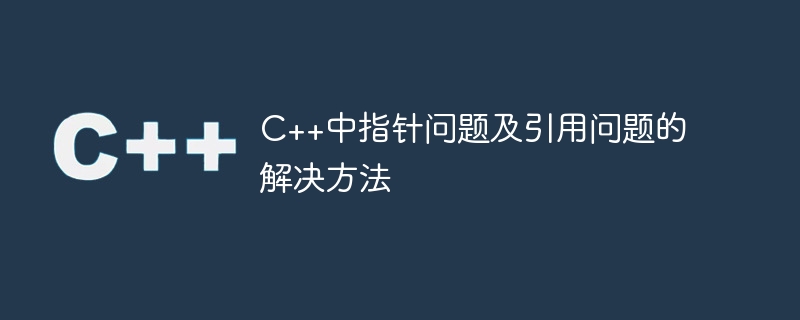

Solutions to pointer problems and reference problems in C
In C programming, pointers are a very important data type that allow us to directly access memory addresses. However, pointers also often cause problems such as null pointer references and dangling pointer references. In addition, we often encounter reference problems, such as function parameter passing and return value reference of reference types. This article details these issues and provides workarounds and specific code examples.
Null pointer reference means that when we try to reference a null pointer, it will cause the program to crash. To avoid this happening, we can check if the pointer is null before referencing it.
int* ptr = nullptr;
if (ptr != nullptr) {
int& ref = *ptr;
// 使用ref进行操作
} else {
// 处理空指针引用的情况
}Dangling pointer reference means that when we refer to a memory that has been released, it will lead to undefined behavior. To prevent this from happening, we can set the pointer to a null pointer after freeing the memory.
int* ptr = new int; // 使用ptr进行操作 delete ptr; ptr = nullptr; // 将指针置为空指针
When we need to modify the variables passed outside the function inside the function, we can use reference type function parameters. This can avoid copy operations inside the function and improve performance.
void addOne(int& num) {
num += 1;
}
int main() {
int num = 10;
addOne(num); // 传递引用类型参数
// num的值已经被修改为11
return 0;
}When we want to return an object created inside a function and want to modify it through the return value, we can use the return value Quote.
int& getNum() {
static int num = 10;
return num;
}
int main() {
int& ref = getNum();
// 通过ref修改num的值
ref = 20;
// 输出20
std::cout << getNum() << std::endl;
return 0;
}Summary:
In C, pointers and references are very powerful tools, but they may also cause some problems. By following the above solutions, we can avoid the problems of null pointer references and dangling pointer references, and take full advantage of function parameter passing and return value references of reference types. These tips can improve the efficiency and reliability of our programs.
However, we still need to be cautious when using pointers and references. Try to avoid the generation of dangling pointers, avoid references to null pointers, and avoid references to released memory. Only by using pointers and references correctly can you take advantage of their advantages and avoid potential problems.
I hope this article will help you understand pointer issues and reference issues in C, and improve your programming skills.
The above is the detailed content of Solutions to pointer problems and reference problems in C++. For more information, please follow other related articles on the PHP Chinese website!




